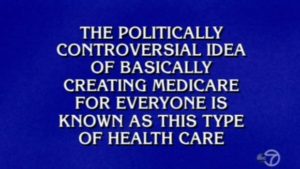“Pondering the Pundits” is an Open Thread. It is a selection of editorials and opinions from> around the news medium and the internet blogs. The intent is to provide a forum for your reactions and opinions, not just to the opinions presented, but to what ever you find important.
Thanks to ek hornbeck, click on the link and you can access all the past “Pondering the Pundits”.
Follow us on Twitter @StarsHollowGzt
Richard Eskow: Medicare For All Is Coming, No Matter What They Say
The idea of Medicare for All, or single-payer health care, has grown in popularity so quickly that it was recently an answer on the quiz show Jeopardy:
More than half of all Americans, 53 percent, now want a single-payer plan, up from 40 percent in 1998-2000.
But at the same time, Medicare for All suffers from the rise of a new growth industry: telling Americans what can’t be done to make their lives better. It seems like the nation that used to pride itself on its “can-do” spirit is constantly being told, “No, we can’t.” Why do critics oppose this idea, which could improve the lives of so many?
Richard Wolffe: Trump Jr’s message to Russian operatives? I’m open for business
Donald Trump Jr is a curious beast. Of all the hotheads around his hotheaded father, the oldest son leads the charge in confirming the president’s very worst instincts.
If there’s a public spat with the media, you can find Trump Jr throwing his own punches. If there’s an ultra-rightwing gadfly (inside the White House or just on the internet), you can find Trump Jr heartily endorsing their comments.
And now we know: if there’s a Russian stranger offering up dirt on his political opponents, Trump Jr will happily sit down with them.
The younger Donald may have many talents. His Twitter bio cites, for instance, his position as “Boardroom Advisor on The Apprentice”. Those capital letters add a surprising degree of gravitas to this part of his résumé.
But whatever his talents, good judgment is not one of them. Nor is honesty.
Nouriel Rubini: Central banks are ending policies like QE – but they’ll be back
Financial markets are starting to get rattled by the winding-down of unconventional monetary policies in many advanced economies. Soon enough, the Bank of Japan (BOJ) and the Swiss National Bank (SNB) will be the only central banks still maintaining unconventional monetary policies for the long term.
The US Federal Reserve started phasing out its asset-purchase programme (quantitative easing, or QE) in 2014, and began normalising interest rates in late 2015. The European Central Bank is now pondering just how fast to taper its own QE policy in 2018, and when to start phasing out negative interest rates.
Similarly, the Bank of England (BoE) has finished its latest round of QE – which it launched after the Brexit referendum last June – and is considering hiking interest rates. And the Bank of Canada (BOC) and the Reserve Bank of Australia (RBA) have both signalled that interest-rate hikes will be forthcoming.
Still, all of these central banks will have to reintroduce unconventional monetary policies if another recession or financial crisis occurs. Consider the Fed, which is in a stronger position than any other central bank to depart from unconventional monetary policies. Even if its normalisation policy is successful in bringing interest rates back to an equilibrium level, that level will be no higher than 3%.
Joe McLean: The Republican healthcare plan has a formidable foe: economics
Having sworn for six years to “repeal and replace” the Affordable Care Act, Senate Republicans, unable to pass a plan before their summer recess, recently got their first taste of how the folks at home feel about it. While many ducked those messy town-hall meetings, they couldn’t avoid hearing the angry voices during Fourth of July parades, picnics and fireworks.
Why are regular people so angry, even in deep red states? Because voters instinctively understand the irreconcilable conflict between political rhetoric, conservative dogma and the hard reality of economics.
On one hand, the devotees of Ayn Rand (Paul Ryan, Rand Paul etc) are on the talk shows explaining that laissez faire capitalism and free-market competition are the answers for better care and lower costs – plus tax cuts for the rich, of course.
On the other hand, Republican moderates recognize the disastrous impact of kicking tens of millions of Americans off their health insurance and rightly fear voters’ backlash. But both camps have chosen to ignore some pretty basic facts they should have learned in economics 101.


Recent Comments